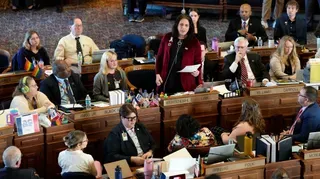February 25, 2017
CA PrEP Program Delayed
Seth Hemmelgarn READ TIME: 3 MIN.
Problems with California's AIDS Drug Assistance Program are leading to the delayed launch of a program that would help people statewide get access to PrEP.
California Department of Public Health officials have said the trouble with ADAP, which is supposed to help thousands of people get the care they need to stay alive, started after the agency switched to new contractors last July. CDPH spokespeople have said the agency's still trying to resolve the issues.
Courtney Mulhern-Pearson, director of state and local affairs at the San Francisco AIDS Foundation, said some clients have reported being turned away by their pharmacies or even being dropped from ADAP because of the glitches.
A.J. Boggs, the new contractor that oversees ADAP's enrollment system, "doesn't appear to be able to fulfill the terms of that contract. ... That's where the biggest problems have been," Mulhern-Pearson said recently.
The problems are extending to helping HIV-negative people get on PrEP, a prevention tool that's seen as a key element in local and state Getting to Zero initiatives to stop the spread of HIV, because so much staff time at the state level is being devoted to the ADAP issues.
The San Francisco AIDS Foundation is part of the California HIV Alliance, which also includes the San Francisco health department, Project Inform, and other agencies.
The alliance recently secured $1 million from the state general fund to create an affordability program that would cover PrEP-related copays and similar costs incurred by people in California whose annual incomes are below 500 percent of the federal poverty level.
Since public and private health insurance and other assistance programs generally cover medication costs, the PrEP program would mostly cover costs such as screening for HIV and other sexually transmitted diseases, lab costs, and counseling, advocates said in their proposal.
"PrEP is a key component of the National HIV/AIDS Strategy as well as California's response to the HIV epidemic," the proposal said. "However, PrEP use among Californians at-risk for HIV remains extremely low and cost is one of the primary barriers to PrEP access."
Mulhern-Pearson said advocates had been told the program would start this spring, but officials are now indicating that won't happen.
"They have not given us a new date," she said.
The problems with ADAP are "taking valuable staff time away from other projects," specifically in the Office of AIDS, she's also said. There have been "multiple conversations" where officials have told advocates that staff have all been tasked with fixing the current system, Mulhern-Pearson said.
Referring to the contractors the state's currently doing business with on ADAP, she said, "I don't know how they would be able to extend the contracts and administer" the PrEP program.
Clarke Anderson, A.J. Boggs' CEO, has previously declined to answer questions from the Bay Area Reporter.
The request for $1 million in state funding was based on existing PrEP assistance programs in Colorado, New York, and Washington. The money, which would cover the first year of California's program, would come from rebate funds generated by ADAP. There aren't specific estimates of what the actual costs would be or how many people would be covered.
"The idea was to get the program up and running," Mulhern-Pearson said, and "then see how many people applied."
"We are just really anxious to have this program up and running," she said. "It's really hard to get calls from clients and not be able to direct them anywhere," and "to see that be a barrier to someone starting PrEP is really frustrating."
Advocates hope "the state can move quickly," she said.
Gay state Senator Scott Wiener (D-San Francisco), a PrEP advocate who's spoken publicly about his use of the prevention method, is planning to talk about the situation to CPDH Director Dr. Karen Smith.
Referring to the PrEP program, Wiener told the B.A.R. that he and others are "frustrated" by the delay.
"We want to get that program going," he said. "The money is there. So we just need to get it moving."
Wiener had been set to meet with Smith last week, but the appointment had to be rescheduled, and a new date hadn't been set as of Friday.
CDPH spokespeople didn't provide comment for this story.






